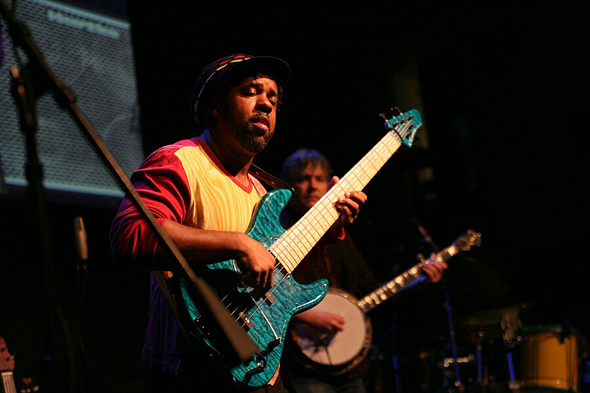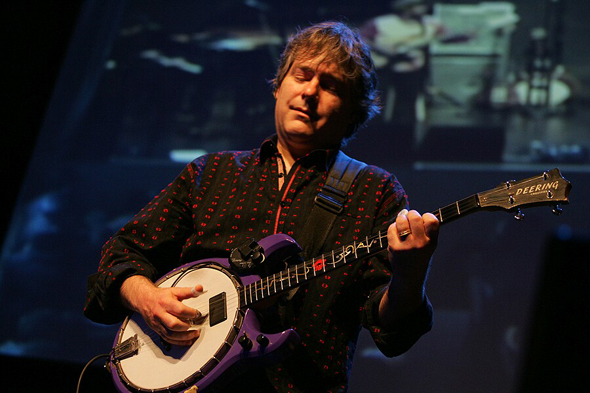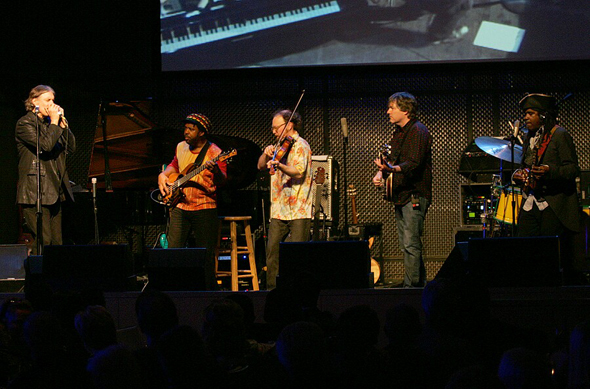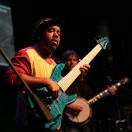
It has been 20 years since Bela Fleck and the Flecktones released an album with the original lineup, and bass virtuoso Victor Wooten has been there since the beginning. Meeting Fleck after a friend suggested that they had similar banjo styles, the scene was set for what would become a full and varied life, one in which Wooten would play the role of Grammy Award winner, published author, teacher, student, naturalist, husband, father, and even magician. He is arguably the most influential bass player since Jaco Pastorius, and to many, he’s an inspiration for learning and further developing skills, both with and without a bass.
Owl and Bear had the chance to catch up with Victor before the The Flecktones’ recent Anthology show. Contributor Jamie Latty and Mr. Wooten talked about his inspirations, family, learning music, Vix Camps, and 20 years in one of the most entertaining live bands on the planet.
Owl and Bear: You started playing bass at a very young age. What was it about the bass that you connected with?
Victor Wooten: The main thing was being able to connect with my four older brothers through music. My older brother Reggie is really who put me on the bass. He knew that they needed a bass player, by the time I was born they already knew that. So that became me right away. And as a little kid, it was a way for me to fit in with my older brothers and do stuff with them but have my own little thing. That was my first connection.
Owl and Bear: Family is obviously a huge part of your life, and for many, it is the source of a musical journey. How important a role do you think playing music has in a child’s upbringing?
Victor Wooten: For me it’s very important. I think it’s as beneficial as learning anything else that we learn in school — arithmetic or anything else. And there have been studies showing that students who study the arts — whether it’s music, drama, painting, or whatever — actually do better academically, so I believe playing a musical instrument benefits everyone’s lives.
Owl and Bear: And how does it make you feel to see so many schools cutting music budgets?
Victor Wooten: They have the right, but I don’t think it’s good to do that because it’s usually based on a monetary thing. And it’s not like sports is proven to make people better in academics, but sports gets a lot of academic money. When they know that arts programs actually do good for students and they still cut the programs, they let us know where their priorities lie, so I don’t feel too good about that.
Owl and Bear: Are all of your children showing signs of Dad’s musical prowess?
Victor Wooten: Yeah they’re all very musical, very musical. They’re all playing. My wife is also very musical. She sings, acts, and dances and so they’re all doing a lot of musical theatre — as well as playing music around the house and actually out there doing gigs, doing performances in places now, which is great.
Owl and Bear: Tell us about your bass and nature camp. How did the idea for that come about and, in your opinion, how do music and nature relate?
Victor Wooten: Well, the main thing is that it’s not just the bass and nature camp anymore. Most of our camps are any instrument now and maybe we do two camps a year that are just for bass players. And that’s the main thing that I want to make sure people know. We’ve done bass camp for so many years but we wanna let the world know that any instrument can attend. So I definitely wanna get that word out there.
We’ve had french horn, violin banjo, lots of things. The main thing is that nature is connected to everything, not just music. There’s nothing that you do that’s not connected to nature, whether you know it or not. But the interesting thing is that, whatever you do, if you do it well enough, people will call you a natural, which means that you are like nature. You see nature is at the top. It’s like the epitome of doing something well because nature flows naturally. In other words, we don’t have to teach a tree how to grow. We don’t have to teach a bird how to sing or a squirrel how to build a nest. These things are natural. They follow their natural instinct, their natural ability and humans don’t do that all the time but when we do, we are being recognized by being called a natural.
So the thing about musicians is, many of us cut ourselves off from nature in order to be natural, which doesn’t make much sense. And so at our camp, we reintroduce nature into not just our curriculum, but everything we do: into our consciousness. We introduce nature as a main teacher and not just a teacher, but as a classroom and we follow nature’s example. And in doing that, people end up approaching music more naturally — and that is the fastest way to get good at anything. It’s finding the natural progression.
Owl and Bear: So you try and push that bigger message. It’s not just the music but how it relates to everything around you as well?
Victor Wooten: Absolutely! The interesting thing is that we just provide opportunities for students. It’s not even that we talk about everything. Like we allow the students to do certain things and a lot of the exercises that we do are blindfolded exercises. And then we give the students opportunities to talk about it afterward. Instead of saying “Hey, we want you to do this exercise and here is what we want you to get out of it,” we just say “Hey, here’s a cool, fun exercise we’re gonna do. Do it if you want. You don’t have to but here it is.” And then afterward, we have a little rap session and people come up with these amazing things that they experienced. And then, when they’re in that mind space, that spirit, when we bring it back to the instrument, things open up. The mind, and the spirit just open up and things just start to flow a lot simpler and that just gives us other things to build off of.

Owl and Bear: You have been with The Flecktones since day one and you famously found out about Bela after you were jamming on a banjo yourself. What made you want to do something with him?
Victor Wooten: I was working at an amusement park in Virginia in the 80’s, playing on a friend’s banjo. That led him to tell me about this guy named Bela Fleck. And in learning about Bela, I was like, “Man, I gotta meet this guy,” and one thing led to another and you know, here we are! It wasn’t even about doing something with him. It was about making a connection. You want to learn from people like that. I want to learn from him. I want to know people who are excelling at what they do. And there was no way to deny Bela’s artistry and excellence at what he was doing. He was doing something totally unheard of on the banjo and that’s the total spirit that I approach my own instrument and I have always been the type of person that when I hear about someone like that, I set out to meet them. I have traveled around the world to meet amazing people, because it inspires me and I never know what’s gonna come out of it — but in this case it’s turned into a career.
Owl and Bear: Bela himself is a virtuoso and an innovator on his instrument, as are the other band members. How do you strike the balance of being able to play your own thing and yet keep it all so tasteful?
Victor Wooten: Well, it’s just like speaking with my own voice. Like when you speak, I can tell you have a distinct voice and you don’t sound like anyone else. It’s not that you’re trying, it’s just that you are speaking the way you naturally speak and again, it comes back to nature — you learn to speak naturally and you continue to speak naturally. That’s the way you become the most individualistic is by being naturally who you are. But as far as working with the band, I have to put the band above myself individually the same way you do a family or any team. The team is greater than you individually. At the same time, I also realize that music is bigger than the band, so my goal is to support the band but the band is going to support music. So what were trying to do is make the best music possible and a lot of the times I have to get out of the way to do that.
Owl and Bear: How do you approach writing your bass part? Does Bela tell you what he wants or do you pretty much get free reign?
Victor Wooten: Well, it starts with that natural process. It starts with the playing. Someone may come up with the song but they will just play their part and allow everyone else to interpret it their own way and that way the band sounds like a band and not just like one person’s interpretation of the band. But, if it’s not going in the right direction, or in any direction that any member of the band doesn’t like, anybody’s allowed to speak up. So we will all say something if we don’t think it’s right or if we think it could just be better. It might just be “Hey, what happens if we try it this way?” The band has always been open that way, and I believe that this is why we have the sound that we have.
More importantly, I believe that’s why the band has stayed together this long. It allows everyone to feel like they are a part of the creation and the future of the band. You’re not just supporting one guy’s vision. Everyone is involved and that’s a key for the survival of any company or family or any unit. Any team.
Owl and Bear: Do you guys ever jam on the banjos?
Victor Wooten: It’s rare! No, we don’t sit together and play banjos now, but every once and a while we will switch instruments. I will play banjo and Bela will play bass, just for fun. But we normally stick to what we do best, you know. [Laughs.]
Owl and Bear: Gear-wise, you are famed for using your Fodera Yin Yang bass that never seems to leave your side. But amp-wise, you recently moved to Hartke. What is it about Hartke that you like?
Victor Wooten: A few things…I was using Ampeg for many many years and I love them. But I am the kind of person that likes change. Life is about change and I like to follow that, and so I was just ready for a change. So after I was finished with Ampeg, I took a year just to try out other things and see what else was out there. And I searched out a bunch of stuff and found a bunch of good sounding gear. But I also realize that if I was going to endorse a company, it’s not just “Does the gear sound good?” There were quite a few things that I was looking for and in the end, Hartke won hands-down. You know, the company needs to be big enough to actually support the artist who travels worldwide.
Also, I like to do clinics so I wanted a company who wanted to sponsor clinics, as well as sponsor the camp that I am doing, because I bought a new place. My wife and I bought a 150-acre farm and turned that into Wooten Woods where all our camps are, so I needed help with that.
Of course, it always starts with the sound of the gear, but really the main thing is that I want to meet the people. I wanna know who Hartke is, who they are as a company. And I actually knew there is a guy called Larry Hartke, so who is that? I realized that if I am gonna endorse a product, I am really endorsing people and I wanna know who that is. So sorta like a marriage, I wanna know who I’m marrying and I also want them to know me. We have to get along personally or else we probably wont get along well business-wise.
I cant speak for other artists but I do know that there are a lot of different reasons to get an endorsement and I agree with you. I see a lot of artists just getting endorsements seemingly for the endorsement’s sake of getting something free and I see a lot of upcoming artists, maybe they’re just starting out already looking for endorsements. And a lot of these artists don’t really look at what is it they have to offer a company. It’s just about “What can I get for free?” But at the same time, it can work the other way — where companies can take advantage of artists. I have found myself on people’s websites with a picture of me maybe holding one of their instruments at a NAMM Show or something that, to make it look like I am supporting their company but I don’t really know who they are. But at the same time, being a popular artist doesn’t mean that you have a lot of money. So a lot of the time, gear and especially strings and things that we continuously need are expensive, and so that’s where endorsements can really help us out. I just wanna make sure my endorsements work both ways and that were helping each other and that I really love the product and the people behind the product.

Owl and Bear: Do you use any effects at all?
Victor Wooten: Yeah I do use some effects. Not much with The Flecktones, I don’t use many effects at all, but I use much more with my own band because I am playing much more of a leader role and playing more melodies and things like that, but I do use a looping pedal quite a bit, and that’s the effect of being able to record myself on the spot and play over what I just played, so that’s probably the main thing that I do use.
Owl and Bear: I was talking to Reggie Hamilton a few years ago and he was explaining his thoughts on how it’s the player that creates the tone, not the instrument. He demoed a signature bass versus an entry level short-scale bass and both sounded incredible. What are your thoughts on the idea that the player creates the sound, not the instrument?
Victor Wooten: I totally agree! The same way Micheal Jordan’s shoes never scored a point, but he could score 50 points wearing any shoes! But he would feel more comfortable in the shoes he is comfortable wearing, so an instrument — whether it’s clothing or anything else we use in our trade — needs to make us the most comfortable. So I play the bass that makes me the most comfortable because I realize that I make the music. The instrument just makes me comfortable and no matter what instrument I play, I will sound like me the same way no matter what microphone you talk through or sing through you will sound like you. So you know, we are looking for the instrument that makes us the most comfortable so that we can make the best music ourselves. That’s the way I look at it.
Owl and Bear: Are there any modern players that have caught your attention and made you think about how you approach your instrument?
Victor Wooten: Absolutely, there’s newer guys that help me see my instrument differently and there’s older guys also. I am always able to see new things, even in the older guys. But there are a lot of great new players that I try and learn from — I try to learn from everybody, good and bad. Things I wanna make sure I do and things I wanna make sure I don’t do. But the important thing is that they’re not all bass players. The ukulele player Jake Shimabukuro raised a lot of awareness for the ukulele. Just watching him play and you can stand on stage with him and feel the passion he is putting in to that instrument that most of us look at as a toy. That’s very inspiring. Being back on stage with Howard Levy, who is playing another toy instrument: the harmonica. You know, he is playing it like Charlie Parker. That’s inspirational! And yeah, I could name bass players, like Hadrien Feraud. Matt Garrison’s not really new but he is one of these new phenomenons. There’s females like Tal Wilkenfeld. There’s people that I meet out at camp and you may never hear of, but I get to see hundreds of players a year at our camps. They are all inspiring and there’s always something to learn.
Owl and Bear: Finally, whats next for Victor Wooten?
Victor Wooten: There’s a lot going on. A lot going on. I’m close to finishing a new record, which is actually two new records. There will be one record featuring all female vocalists, but you will also be able to get the same record as an instrumental record, so we will be releasing two separate versions. I got that going on with my new label (Ed: Victor also just released The Groove Regulator by longtime drummer and friend J.D. Blair on Vix Records) and other new products. I have also three-fourths finished a new book which is a sequel to The Music Lesson (Ed: Victor’s very popular book about music and life lessons), which I am very excited about finishing.
Fans of Victor Wooten can still sign up to his Wooten World Won Hundred Sweepstakes at www.victorwooten.com to answer questions each week from Victor himself and be in with a chance of winning some incredible prizes!
